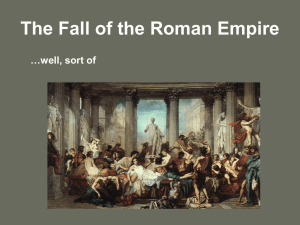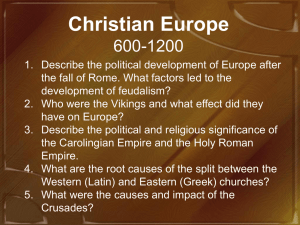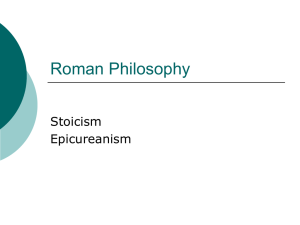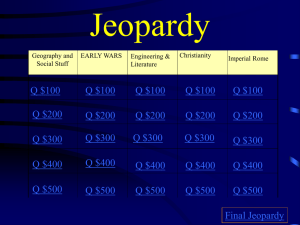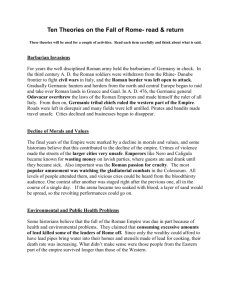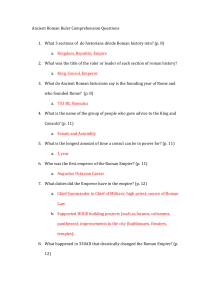Fall of Rome - SchoolNotes
advertisement
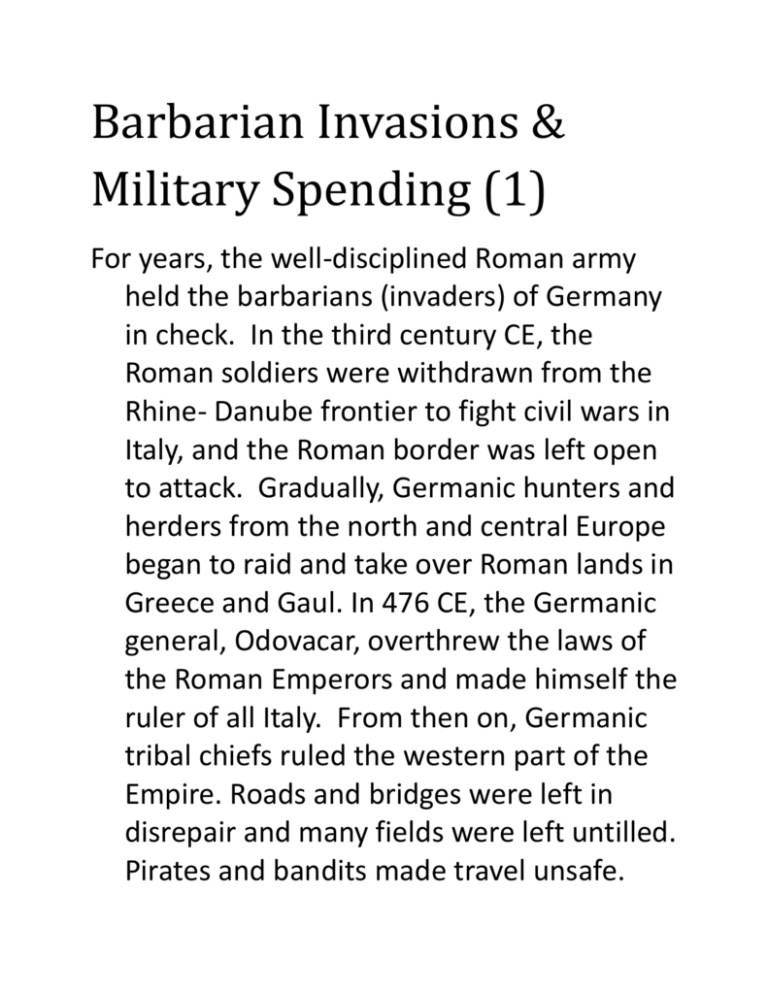
Barbarian Invasions & Military Spending (1) For years, the well-disciplined Roman army held the barbarians (invaders) of Germany in check. In the third century CE, the Roman soldiers were withdrawn from the Rhine- Danube frontier to fight civil wars in Italy, and the Roman border was left open to attack. Gradually, Germanic hunters and herders from the north and central Europe began to raid and take over Roman lands in Greece and Gaul. In 476 CE, the Germanic general, Odovacar, overthrew the laws of the Roman Emperors and made himself the ruler of all Italy. From then on, Germanic tribal chiefs ruled the western part of the Empire. Roads and bridges were left in disrepair and many fields were left untilled. Pirates and bandits made travel unsafe. Cities declined and trade and business began to disappear. Barbarian Invasions & Military Spending (2) “Rome, like all great empires, was not overthrown by external enemies but undermined by internal decay… The military crisis was a result of the proud patrician class and their shortage of children. Foreigners poured into this void… The Roman army was composed entirely of Germans, or of other nationalities… The empire had grown so large that an incredibly large number of soldiers were needed to defend it, and most had no allegiance to their empire.” Map of the Roman Empire, 177 CE: On Screen Environmental/Public Health Problems (1) Some historians believe that the fall of the Roman Empire was due in part because of health and environmental problems. They claimed that consuming excessive amounts of lead killed some of the leaders of Rome off. Since only the wealthy could afford to have lead pipes bring water into their homes and utensils made of lead for cooking, their death rate was increasing. What didn’t make sense were those people from the Eastern part of the empire survived longer than those of the Western. Urban Decay Wealthy Romans lived in fancy houses called a domus. These houses had marble walls, floors with intricate colored marble tiles, and windows made from real glass. However, most of the people of Rome were not rich. The others lived in small, smelly rooms in apartment houses with 6 or more rooms called islands. Each island covered an entire block. At one time there were more than 44,000 apartment houses with in the city walls of Rome. The poor did not occupy first floor apartments, as the rent was too high. As the people climbed up the shaky wooden stairs to the higher-level dwellings, the rent was cheaper, and the apartments became warmer, darker, and more crowded. Anyone who could not afford to pay the rent was forced to move out and live on the crime infested streets. Because so many people lived on the streets, the cities began to decay. Urban Decay in Ancient Rome—See picture. Inflation and Economic Concerns (1) After the reign of Marcus Aurelius, the Roman economy suffered from inflation, which is an increase in prices. Once the Romans stopped conquering new lands, the flow of silver into the economy decreased. On the other hand, Romans spent a lot of their silver on luxury items. This meant there was less silver to use for coins. The amount of silver was decreased in the making of the coins, and then the coins became less valuable. To make up for this loss in value, the merchants increased the prices on the goods they sold. Many people stopped using coins and began to barter (trading goods rather than using money) to get what they needed. Eventually salaries had to be paid in food and clothing and taxes were collected in fruits and vegetables. Inflation and Economic Concerns (2) During the latter years of the Empire, farming was done on large estates that were owned by wealthy men that used slave labor. These farmers who had to pay the workmen could not produce goods as cheaply as a slave owner could; nor could the crops sell as cheaply. Since these farmers could not compete with the lower prices, many lost or had to sell their farms. Thousands of the previous employees filled the cities looking for work, finding there were not enough jobs to accommodate them. At one time, the emperor was importing grain to feed the more than 100,000 unemployed people just in the city of Rome. Emperors of Rome (after 235 CE) See chart. Rise in Christianity (2) The Christian religion, which was monotheistic (believing in only one god) ran counter to the traditional Roman religion, which was polytheistic (many gods). At different times, the Romans persecuted the Christians because of their beliefs, which were popular among the poor. In 313 C.E., Roman emperor Constantine the Great ended all persecution and declared toleration for Christianity. Later that century, Christianity became the official state religion of the Empire. This drastic change in policy spread this relatively new religion to every corner of the Empire. By approving Christianity, the Roman state directly undermined its religious traditions. Finally, by this time, Romans considered their emperor a god. But the Christian belief in one god — who was not the emperor — weakened the authority and credibility of the emperor. The Spread of Christianity -- See map. Decline in Morals and Values (2) The Roman philosopher Seneca took a dim view of gladiatorial contests and the spectacle that accompanied them. Interestingly, his criticism is not based on revulsion at the butchery he witnesses, but because the display is boring and therefore unworthy of the attention of a well-reasoned man. In a letter to a friend, he describes what he saw in the arena during the reign of Emperor Caligula: "There is nothing so ruinous to good character as to idle away one's time at some spectacle. The other day, I chanced to drop in at the midday games, expecting sport and wit and some relaxation to rest men's eyes from the sight of human blood. Just the opposite was the case. Any fighting before that was as nothing; all trifles were now put aside - it was plain butchery. The men had nothing with which to protect themselves, for their whole bodies were open to the thrust. The common people prefer this to matches on level terms or request performances. Of course they do. The blade is not parried (blocked off) by helmet or shield, and what use is skill or defense? All these merely postpone death. In the morning men are thrown to bears or lions, at midday to those who were previously watching them. The crowd cries for the killers to be paired with those who will kill them, and reserves the victor for yet another death. The Colosseum—See picture.


